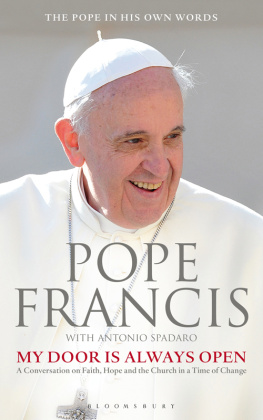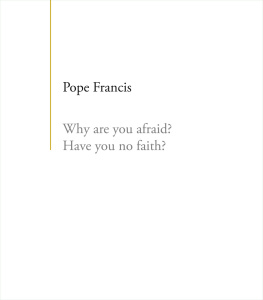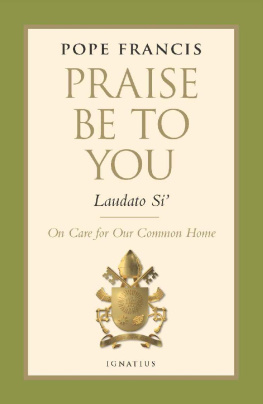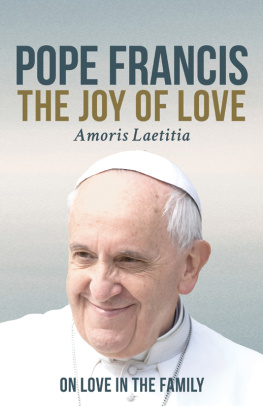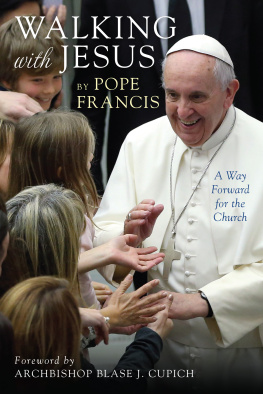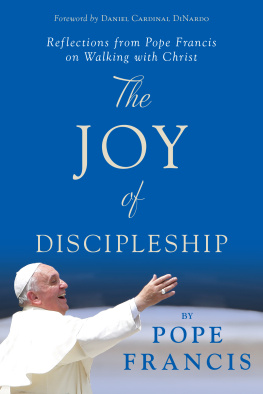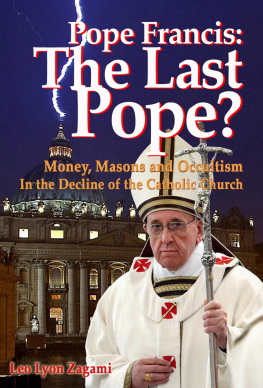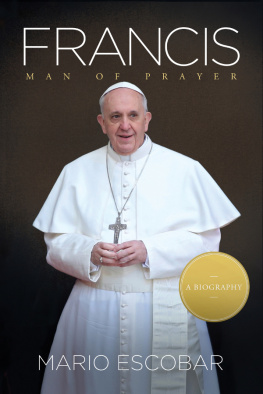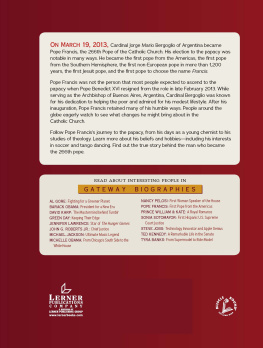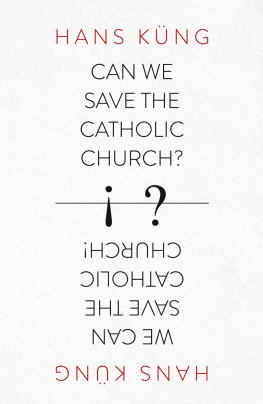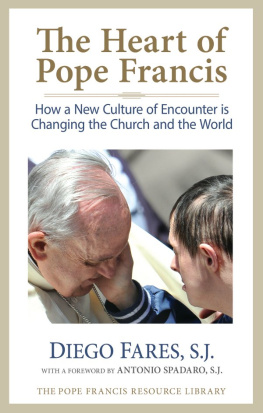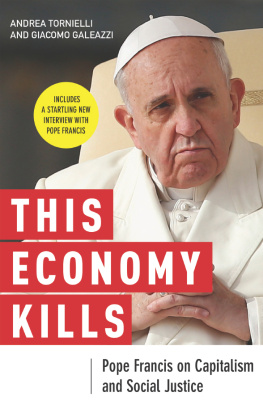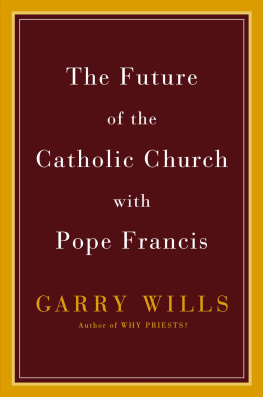Pope Francis
Im bold, but Im also shy. In Buenos Aires I was rather afraid of journalists. I thought they could put me in an awkward position, so I didnt give interviews. But one day I allowed myself to be persuaded by Francesca Ambrogetti, thinking of the good that might come of it. She convinced me, and I trusted her. So once a month, at nine oclock in the morning, I saw her and Sergio Rubn, and that led in the end to the publication of the interview book called El Jesuita. Ive always feared negative interpretations of what I say. I didnt like the cover of that first interview as archbishop of Buenos Aires, but I was very happy with everything else. Thats how the story of my interviews as archbishop began. I went on to give others to Marcelo Figueroa and Abraham Skorka. Always trusting the people with whom I was speaking.
I was already Pope when Fr Antonio Spadaro came to ask me for an interview. My instinctive reaction was one of uncertainty, as in the past, and I said no. Then I felt that I could trust him, that I had to trust him. And I accepted. I did two long interviews with him, which are collected in this volume. Spadaro is the editor of Civilt Cattolica, a journal that has always been closely linked to the popes. He was present for the interviews and conversations in this book, and transcribed my words.
After that first interview in August 2013 came the others, including the ones that I gave on the plane on the way back from apostolic journeys. Again, on those trips, I like to look people in the eye and answer their questions sincerely. I know I have to be prudent, and I hope I am. I always pray to the Holy Spirit before starting to listen to the questions and giving my answers. And just as I mustnt lose my prudence, I mustnt lose my trust either. I know that this can make me vulnerable, but its a risk Im willing to take.
For me, interviews always have a pastoral value. Everything I do has a pastoral value in one way or another. If I didnt have that trust, I wouldnt grant interviews: its very clear to me. Its a way of communicating my ministry. And I unite those conversations with the daily form of the homilies at the chapel of Santa Marta, which is so to speak my parish. I need that communication with people. There, four days a week, 25 people from a Roman parish come to see me, along with others. I have a genuine need for that direct communication with people. Granting an interview isnt like climbing into the pulpit: it means meeting journalists who often ask you questions from the people. Another thing I enjoy is talking to little magazines and popular newspapers. I feel even more at ease. In fact, in those cases I really listen to the questions and concerns of ordinary people. I try to answer spontaneously, in a conversation that I intend to be easily comprehensible, and not using rigid formulas. I also use simple, colloquial language. For me, interviews are a dialogue, not a lesson.
Thats why I dont prepare. Sometimes I receive the questions in advance, but I hardly ever read them or think about them. Quite simply, nothing comes to mind. Other times, on the plane, I imagine the questions they might ask me. But to answer, I need to meet the people and look them in the eyes. Yes, Im afraid of being misinterpreted. But, I repeat, I want to take that pastoral risk. It happens to me in other cases too. Sometimes Ive found in my interviewers even in those who say they are very far away from faith great erudition and intelligence. And also, in some cases, the ability to be touched by Pascal. That moves me, and I greatly appreciate it.
This book also contains two conversations with the Superiors General of the religious orders. I have always asked them for genuine dialogue. Ive never wanted to give speeches, or to have to listen to them. Conversation has always seemed to me to be the real way to meet one another.
In this book there are also a number of conversations with Jesuits. Im glad that theyve been included in this collection. I must say that I feel those moments are very free, especially when they happen during trips: this is my opportunity to reflect on the trip in question for the first time. I feel as if Im surrounded by my family, and I speak our family language, and Im not afraid of misunderstandings. So what I say can sometimes be a little risky. I asked Fr Antonio to revise the texts before publication, but I havent cut anything. In fact, sometimes I feel I have to say what I say to myself, and thats important for me too. In conversations some important things arise that I then think about later. For example, in my meeting with Polish Jesuits I spoke about discernment. On that occasion I became powerfully aware of the specific mission of the Society of Jesus today, which is also a very important mission of the Church for our times.
I want a Church that is able to find its way into conversations between people, a Church that knows how to engage in dialogue. It is the Church of Emmaus, in which the Lord interviews the disciples who have become discouraged. For me, the interview is part of that conversation between the Church and the people of today.
Antonio Spadaro SJ
A WORD THAT KEEPS THE MESSAGE ALIVE
Let us remember that you need never answer questions that no one asks. (Pope Francis, Evangelii gaudium, no. 155)
It was 13 June 2013. I was waiting, with the other members of the Community of Civilt Cattolica, to be admitted into an audience with Pope Francis in the Apostolic Palace. It was an audience that every pope has wanted at the start of his ministry, given the close traditional link between the journal and the pontiffs. I was summoned by a monsignore, who told me that the Holy Father was waiting for me, to have a brief conversation before the audience. I went. It was on that occasion that I asked Francis for an interview. He answered with a clear and definite No. And, as if by way of self-justification, he told me how difficult he found giving interviews. He told me he preferred to think, rather than give on-the-spot answers in interviews.
Then I saw that he was starting to change his mind. I saw him in a state of discernment, as if realizing that it might be a path to travel. So he agreed to answer in writing a series of questions posed in advance, also in writing. In fact, I had the opportunity to hand him my questions (20 of them!) by hand in Brazil, during his visit for World Youth Day, one morning after Mass. But after reading them, once we were back in Rome, he called me to say he preferred to conduct the interview verbally, in a one-to-one dialogue. We agreed the date: 19 August 2013. Then we spent three afternoons going through that interview together.
EYE TO EYE
And Francis really does look you in the eye. What I try to do, even today, is look people in the eye, he told me in the interview I had with him in 2016 for a book of all his writings as archbishop of Buenos Aires (My Word is In Your Eyes). And he confirms it in the preface that he wrote for that volume. His word is in the eyes of the person or people that he has in front of him. That is, it emerges from a dialogue, it is not prefabricated. We know that there is a freshness to Bergoglios words thanks to the oral doctrine that he has been giving from Casa Santa Marta since the start of his pontificate.
Reading the present volume, we can see once more that his words are broken in order to be shared at the moment of their offering. There is a vital tension that cannot really be domesticated by being given a finish polish in the workshop. And the context of the interview or the conversation is ideal.


